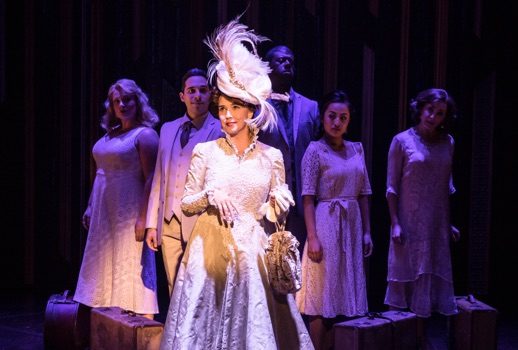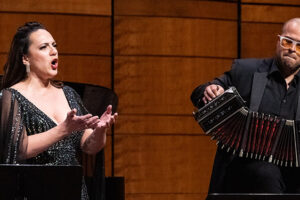

“Pack up the luggage, la la la. / Unpack the luggage, la la la. / Spot-clean this tea gown, la la la.”
At the end of Act I of A Little Night Music, as the sharp-tongued members of the Armfeldt, Malcolm, and Egerman families forego makeup, don white and troop off to Madame Armfeldt’s country estate, one has to wonder: with all the mudslinging, how on Earth will these fictitious luminaries of turn-of-the-century Swedish society keep their clothes clean?
And on some level, I think Sondheim wants us to think this. A Little Night Music has to be Stephen Sondheim’s fussiest show. Fussy to perform, fussy characters, and fussy to watch. The whole thing is written in waltz time, for heaven’s sake. Night Music demands the musical resources of an opera company, singing actors who can effectively convey a palette of ulterior motives and flamingly repressed emotions, and a staging that balances fact that the subject is more fitting of a chamber musical than the execution portrays.
Assemble these elements, and you have the bare minimum, and then do the show’s structural flaws, like the too hastily resolved lieto fine of act II, come into focus. The bar rests pretty high, but that bare minimum still yields an extraordinarily entertaining result. That’s why Night Music remains such a gem, and Arlington, Virginia’s Signature Theatre production allows it to glisten so delightfully.
It’s hard to determine who deserves the most for this seamless and heartfelt staging, which closed yesterday in the Max Theatre. It could be Eric Schaeffer’s fluid direction, combined with Karma Camp’s gentle choreography, that refuses to yield to the piece’s inconsistencies. It could also be the anchoring provided by the two experienced leads, Holly Twyford as Desiree and Bobby Smith as Frederik. Or maybe it’s the high caliber of the supporting cast. Whatever it may be, it’s not gimmicky, it’s not indirect, and it’s not fussy.
Even the performances are a breath of fresh air. Holly Twyford made a delightfully bawdy Desirée, both the source and the punchline of every joke, and is charmingly tender with Fredrika. Her recognizable speaking voice and emotive, statuesque physicality made her eye-catching as the once-great actress, going from towering to cowering in an instant. Only her “Send in the Clowns,” quietly lamented at first, but then outright sobbed in the second verse once Frederik has left, lacked the stylistic refinement of the rest of her portrayal.
Her counterpart, a self-deprecating Bobby Smith as Frederik, sang firmly with smooth tone and an ensemble-anchoring consistency.
They were well complimented by Nicki Elledge, a true Nordic beauty with a creamy high soprano, as Anne Egerman and a hyper-focused Sam Ludwig, singing with intensity and virulent if not effortless high notes. Will Garthshore was the appropriate level of blustery as Count Carl-Magnus Malcolm and the imposing Maria Egler, substituting for Tracy Lynn Olivera made a wonderfully layered and sardonically hysterical Countess Charlotte Malcolm.
As Petra, Anne’s infinitely more experienced maid, Maria Rizzo was lusty and concise, though her “I Shall Marry the Miller’s Son” was ornamented with such twang way that I thought her weekend in the country must have been spent in the suburbs of Nashville.
Anna Grace Nowalk was a delightful Fredrika, showing shades of her mother with a healthy dose of unironic self-awareness. And as Madame Armfelt, Florence Lacey, despite singing with consistent firmness and giving variety to her numerous zingers, seemed even a tad too lucid on occasion as the grand old dame who’s seen it all. John Kalbfleisch, balancing precision of tempo with sweeping lyricism, lead the orchestra.
Robert Perdziola and Colin K. Bills provided subdued costumes and lighting, and though Paul Tate Depoo III’s set was spare, it came with its own moments of noisiness.
Watching Night Music as a Sondheim fan made me thing that this show, so dissimilar in its contents and execution than his other shows, seems like an experiment in style. But then again, all of his shows seem like that. In the documentary Six by Sondheim, the composer talks about how his mentor Richard Rodgers instructed him to create musicals based on a play he admired, a play he enjoyed or considered flawed, an existing novel or short story not previously dramatized, and something original.
As a composer who’s never had a particular style, he seems to have taken this advice to experiment with him through his career. How lucky we are to be his test subjects!
Photo: Paul Tate dePoo III























Comments